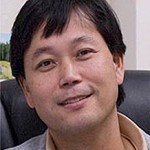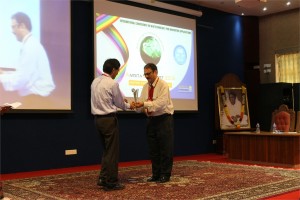 Shigeki Miyamoto, Ph.D.
Shigeki Miyamoto, Ph.D.
Professor, McArdle Laboratory for Cancer Research – UW Carbone Cancer Center
Department of Oncology, School of Medicine and Public Health
University of Wisconsin-Madison
“Inside-out” NF-κB signaling in cancer and other pathologies
The NF-κB/Rel family of transcription factors contributes to critical cellular processes, including immune, inflammatory and cell survival responses. As such, NF-κB is implicated in immunity-related diseases, as well as multiple types of human malignancies. Indeed, genetic alterations in the NF-κB signaling pathway are frequently observed in multiple human malignancies. NF-κB is normally kept inactive in the cytoplasm by inhibitor proteins. Extracellular ligands can induce the release of NF-κB from the inhibitors to allow its migration into the nucleus to regulate a variety of target genes. NF-κB activation is also induced in response to multiple stress conditions, including those induced by DNA-damaging anticancer agents. Although precise mechanisms are still unclear, research from our group has revealed a unique nuclear-to-cytoplasmic signaling pathway. In collaboration with bioengineers, clinicians and pharmaceutical industry, our lab has developed new methods to analyze primary cancer patient samples and identified several compounds with different mechanisms that mitigate this cell survival pathway. Further contributions from other labs have also revealed additional mechanisms and molecular players in this “inside-out” signaling pathway and expanded its role in other physiological and pathological processes, including B cell development, premature aging and therapy resistance of certain cancers. Our own new findings, along with these recent developments in the field, will be highlighted.

Syed Salman Lateef and Vinayak A K
Development of Supercritical Fluid Chromatography methods for the replacement of existing USP Normal phase liquid chromatography methods
Normal phase liquid chromatography methods often have long run times and involve environmentally toxic/costly solvents. Supercritical chromatography methods on the other hand are faster, inexpensive, and eco-friendly. The low viscous supercritical carbon dioxide operates at high flow rates compared to LC without losing separation efficiency. In this work, SFC methods are developed to replace three United States Pharmacopeial (USP) normal phase achiral methods – prednisolone, tolazamide and cholecalciferol. System suitability parameters of the normal phase method are compared against the SFC method. Precision, linearity and robustness of the new SFC methods are demonstrated. SFC methods were found to be cost effective in terms of analysis time and solvent savings. The SFC method does not require purchase and disposal of expensive environmentally hazardous chemicals. Hence, the newly developed SFC method provides a faster and safer solution.

